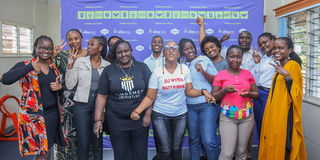Breaking barriers: Empowering African youth innovators to revolutionise access to sexual and reproductive health
Sponsored by Planned Parenthood Global

IDEA Initiative innovators.
Empowering young people to advocate for better health and access to sexual reproductive health services is at the heart of the IDEA Initiative Africa programme.
Planned Parenthood Global and Nailab Accelerator launched the IDEA Initiative Africa programme in June 2022 to empower young people to advocate for better health and access to sexual and reproductive health services.
Nailab Accelerator has been implementing the programme, which guides young people, artists, entrepreneurs, and creatives, to co-create innovative solutions for sexual and reproductive health challenges. By offering technical support and financing, the programme seeks to tackle issues such as unfriendly health services in clinics, where negative attitudes from healthcare workers can deter youths from seeking care. It also aims to address the lack of relevant knowledge among the youth regarding their sexuality, access to contraception, maternity health services, consent, discrimination among people with disabilities, and other related concerns in the communities it engages with.
Through this initiative, young individuals will be empowered to develop ground-breaking ideas and initiatives that can transform the landscape of sexual and reproductive health.
By nurturing collaboration between various sectors, including artists, journalists, technologists, and more, the programme fosters an inclusive approach to finding comprehensive solutions. Together, we strive to create a society where everyone has equal access to dignified and high-quality reproductive healthcare services
Cohort one of the IDEA Initiative Africa
Cohort One of the programme successfully came to a close on November 25, 2022, and announced the top three innovations from a pool of over 70 applicants (entries).
The top innovators from cohort one
- Art for Change is empowering artists in the community to use their talents to spark conversations and drive social change, and address various thematic sexual and reproductive health and rights (SRHR) aspects, including gender-based violence, menstrual health, sexuality education, contraception, maternity health services, and consent.
- Beauty in Disability provides a safe environment for individuals with disabilities to talk about their SRHR challenges. Some of the challenges they address include lack of access to reproductive health information, sexual education, support, and discrimination.
- SRHR School for Journalism trains journalists in responsible reporting on SRHR thematic challenges. By providing them with the knowledge and skills they need to accurately report on these issues, they are helping to combat misinformation and stigma.
Cohort Two of the IDEA Initiative Africa
Cohort Two of the programme attracted over 150 applications from Kenya, Uganda, Rwanda, Ethiopia, and Tanzania. The cohort successfully came to a close on January 5, 2023, and announced its top innovators.
- The Fabs model project in Kenya. The initiative is making significant strides in the development of a comprehensive SRHR curriculum for children with intellectual disabilities. It focuses on key aspects such as puberty, menstrual hygiene, and sexuality education, aiming to equip them with essential knowledge and promote informed decision-making.
Through an inclusive approach, the programme bridges the knowledge gap and instils confidence and self-esteem in the children. By destigmatising these topics, it champions the rights of children with intellectual disabilities, envisioning a future where all children can access impactful SRHR education.
- Vuga Ukire is a digital solution that uses gaming and board games to educate young people in Rwanda about their bodies, consent, and contraception. They have created an online platform that offers access to counselling sessions on reproductive and mental health aspects.
- Senga 2.0 is a mobile app in Uganda that educates young people on reproductive physiology, puberty, and safe sex practices like abstinence and contraceptives, while addressing the responsibilities and consequences of sexual activity.
As part of the programme, the top innovators that were selected from cohorts one and two went through an enterprise development technical support programme conducted by Nailab Accelerator to refine their ideas further and prepare them for implementation and sustainability. The support provided mentorship and guidance to the selected innovators on project development, fundraising, and implementation.
Valuable insights through the lens of the innovators
The Fabs: “We are incredibly grateful for the invaluable guidance and mentorship we received through the IDEA Initiative programme. With their support, we were able to refine our go-to-market strategy and gain a deeper understanding of how to effectively reach and serve our target market. As a result, we have been able to form partnerships with three special needs schools, and we currently have six caregivers, 77 parents, and 77 children with moderate intellectual disabilities, on board. We are thrilled to have received a grant of $2,652 to further advance our work.”

The Fabs.
Art for Change: “Thanks to the invaluable guidance and mentorship we received through the IDEA Initiative programme, we successfully launched our very first art centre for youth in Dandora on April 8. As a result, we have reached over 70,000 people on social media with information about sexual reproductive health through art, and created income opportunities for 17 artists so far. We are happy to receive a grant of $4,756 to advance our work.

Art for Change.
In conclusion, the IDEA Initiative Africa programme has created a safe and inclusive space for youth innovators to express themselves and build their ideas in sexual reproductive health, acting as catalysts for change within their communities.
Furthermore, the opportunities presented by the IDEA Initiative extend beyond the programme itself. Through partnerships with like-minded organisations, policymakers, and advocates, we can create a ripple effect that influences public discourse, challenges harmful stigmas, and brings accurate information to the forefront. By building strong networks and leveraging technology, we can reach wider audiences and amplify the call for change.


